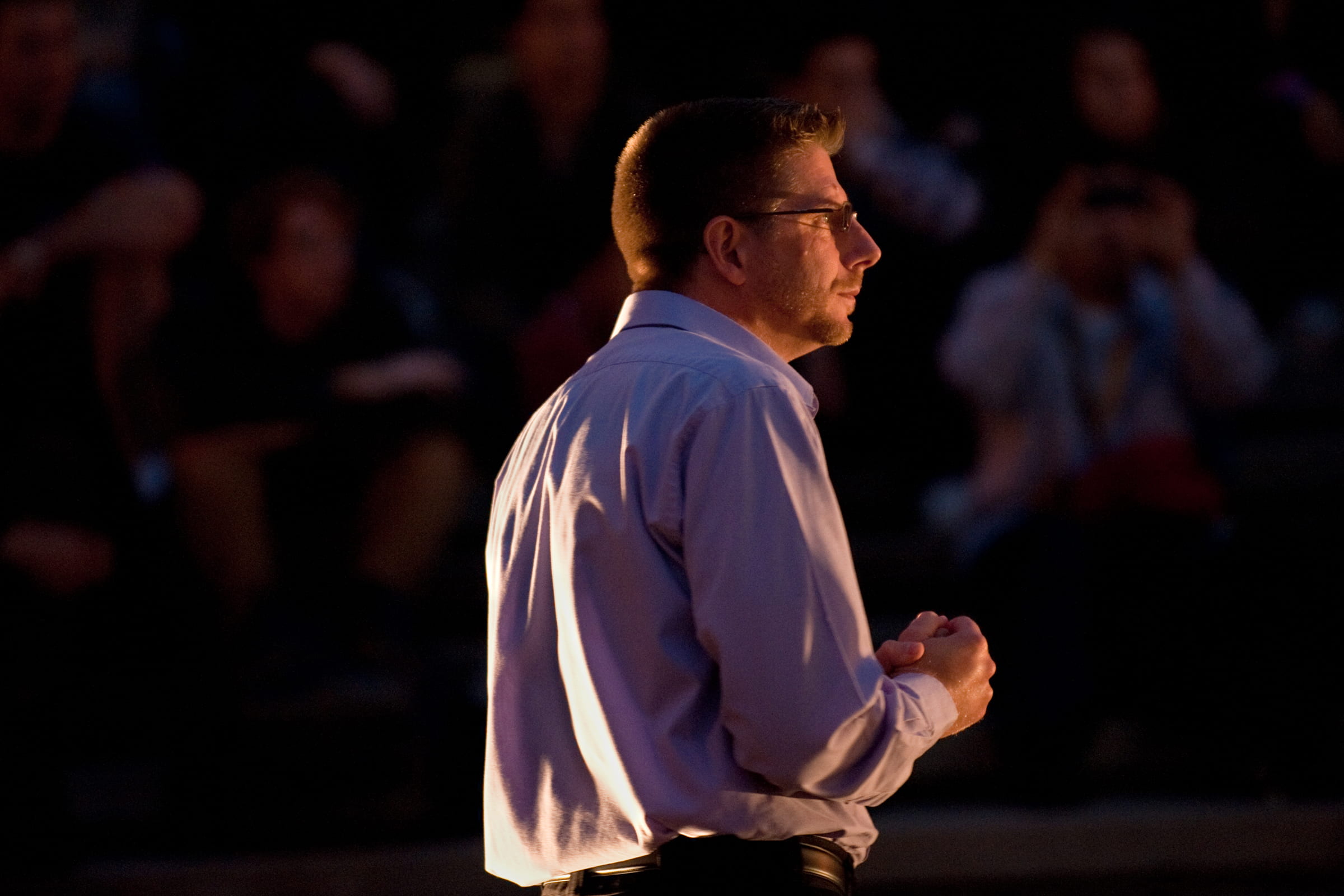Helping LGBT students feel at home
David Bishop, center director of the Lesbian Gay Bisexual Transgender Resource Center, works to make UCI a model of tolerance and inclusivity.

David Bishop, director of UC Irvine’s Lesbian Gay Bisexual Transgender Resource Center, has populated his office shelves with an odd assortment of action figures and cartoon characters. But there’s one thing the Pink Panther, SpongeBob SquarePants, Batman and Robin, and the others have in common: “All are rumored to be LGBT,” Bishop says with a laugh.
“Two years ago, after I became director, I noticed students talked to me differently, like they were intimidated,” he explains. “That’s why I have the toys — so they can see I’m really a kid. I try to create a relaxing atmosphere, because sometimes students come here in a crisis.”
Bishop may not take himself seriously, but he knows his role on campus is a critical one. He’s working to ensure LGBT students feel welcome at UCI, and he’s trying to prevent tragedies like the recent suicides of at least half a dozen bullied LGBT teenagers across the country.
According to the national nonprofit group Campus Pride, 23 percent of LGBT staff, faculty and students in higher education have experienced harassment — defined as any conduct that interferes with their ability to work or learn.
Whether talking with a single student shunned by his friends after coming out or addressing the campus community — as he did in October at the LGBT center’s candlelight vigil for the suicide victims — Bishop shares the same message: At UCI, you are accepted, no matter what your sexual orientation or gender identity.
“I want to be sure the LGBT voice is heard,” he says. That’s also the reason he serves as staff co-chair of the Chancellor’s Advisory Committee on the Status of Staff – so he can reach his colleagues as well.
Bishop recently discussed the mission of UCI’s Lesbian Gay Bisexual Transgender Resource Center.
Q. What is the center’s role, and why do students come here?
A. We provide direct services for LGBT students. Many are struggling with their identity. Some come to us because they can’t be themselves in their homes or their dorms. Some don’t have a family; they’ve been disowned by their parents. To them, this center is like a family. Here, they can be authentic.
The LGBT population has a higher risk of alcohol, drug and tobacco use and suicide than their non-LGBT peers. I’m not a therapist, so if students have serious mental health issues, I refer them to a professional. But I’m good at talking with people and have 20 years of counseling experience. And, as a gay man, I identify with the community.
The students who don’t visit our office because they’re afraid of the stigma are the ones we really worry about. They’re completely isolated. That’s why the center also serves the entire campus community — we have to change the culture, to become more accommodating and inclusive.
Q. There have been highly publicized cases across the nation lately of LGBT bullying. Is the problem getting worse or just getting increased media attention?
A. We began noticing more hate talk two years ago, around the time people started debating Proposition 8 [the California measure — which passed — to restrict marriage to opposite-sex couples]. No matter what side of the issue they were on, people engaged in dialogues about what was moral, what was legal.
Unfortunately, some now think it’s OK to say hateful things. I’ve met with the directors of LGBT centers at other UC campuses, and they’re seeing an escalation of hate crimes, language and incidents. The Davis center was vandalized, and at UC Riverside two students were hospitalized as a result of gay-bashing. And at Cal State Long Beach, a transgender man was attacked as he walked into a bathroom. They beat him and carved the word “it” on his chest. That’s one reason we’ve supported gender-neutral bathrooms on campus — so LGBT students will feel safe.
Q. Has technology — specifically social media like Facebook and Twitter — added to the problem of harassment?
A. In the cyber world, bullying is 24/7. There’s no escape from it, and it’s visible to everyone. The student being harassed can’t hide it from their families or get away from it after school. It’s tragic that some feel the only way they can remove the problem is to remove themselves.
Q. What steps can the UCI community take to be more inclusive?
A. We need to change the climate and the way we use language. It’s in our daily vernacular to say “That’s so gay” — where “gay” equals “stupid.” A lot of us have been harassed and called names like “faggot.” We encourage our straight allies to show their support and speak out against offensive language.
The LGBT community represents 7 percent to 15 percent of the student population. [In a UC survey of undergraduates, 4.5 percent identified themselves as LGBT, 2.7 percent were uncertain of their sexual identity, and 4.9 percent declined to state.] These students need to see that people at UCI care. They need to know that not all straight people are against them — so they don’t feel so alone.
Anyone on campus can participate in the center’s ally development program. A four-hour Safe Zone workshop teaches the basics of LGBT — what it means, how to communicate and how to be supportive. Many straight students and some entire departments have gone through the training because they realize the importance of welcoming the community. And they know that college is hard enough without feeling like you don’t belong.
